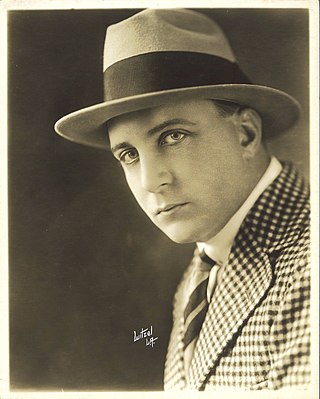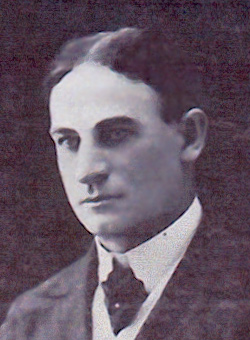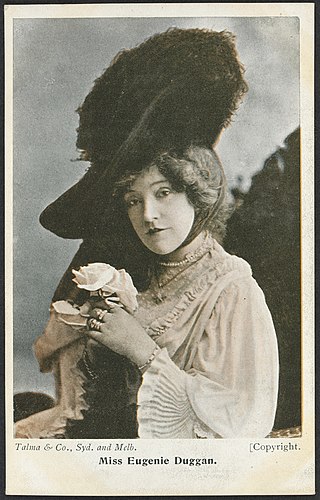Related Research Articles

William Joseph Lincoln was an Australian playwright, theatre manager, film director and screenwriter in the silent era. He produced, directed and/or wrote 23 films between 1911 and 1916.

Arthur Shirley was an Australian actor, writer, producer, and director of theatre and film. He experienced some success as a film actor in Hollywood between 1914 and 1920.
The Squatter's Daughter is a 1933 Australian melodrama directed by Ken G. Hall and starring Jocelyn Howarth. One of the most popular Australian films of the 1930s, it is based on a 1907 play by Bert Bailey and Edmund Duggan which had been previously adapted to the screen in 1910.

Albert Edward Bailey, better known as Bert Bailey, was a New Zealand-born Australian playwright, theatrical manager and stage and screen actor best known for playing Dad Rudd, in both mediums, the character from the books penned by Steele Rudd.

Edmund Duggan was an Irish-born actor and playwright who worked in Australia. He is best known for writing a number of plays with Bert Bailey including The Squatter's Daughter (1907) and On Our Selection (1912). His solo career was less successful than Bailey's. His sister Eugenie was known as "The Queen of Melodrama" and married noted theatre producer William Anderson, for whom Duggan frequently worked as an actor, writer and stage manager.

Alfred Rolfe, real name Alfred Roker, was an Australian stage and film director and actor, best known for being the son-in-law of the celebrated actor-manager Alfred Dampier, with whom he appeared frequently on stage, and for his prolific output as a director during Australia's silent era, including Captain Midnight, the Bush King (1911), Captain Starlight, or Gentleman of the Road (1911) and The Hero of the Dardanelles (1915). Only one of his films as director survives today.

Captain Midnight, the Bush King is a 1911 Australian silent Western film about the fictitious bushranger Captain Midnight. It was the directorial debut of actor Alfred Rolfe. The film is based on the play of same name by W. J. Lincoln and Alfred Dampier. Captain Midnight, the Bush King is now considered lost.

The Lady Outlaw is a 1911 Australian silent film set in Van Diemen's Land during convict days.
Caloola, or The Adventures of a Jackeroo is a 1911 Australian silent film directed by Alfred Rolfe based on a novel published the previous year by Clement Pratt.
The Sin of a Woman is a 1912 Australian silent film directed by Alfred Rolfe.
Cooee and the Echo is a 1912 Australian silent film directed by Alfred Rolfe. It is considered a lost film.
The Cheat is a 1912 Australian silent film directed by Alfred Rolfe. It is considered a lost film.
Won on the Post is a 1912 Australian silent film directed by Alfred Rolfe set against a backdrop of horseracing.

The Squatter's Son is an Australian film completed in 1911 and directed by E. I. Cole. It was based on a play which Cole and his company had performed throughout Australia.

The Sundowner is an Australian film shot in Victoria. Set in the Australian bush, it was billed as "a romance with many startling adventures".
The Shepherd of the Southern Cross is a 1914 Australian silent film about an Englishwoman torn between two men. It was the first feature film produced by Australasian Films.

Eugenie Marian Duggan was a popular Australian stage actress. She was the sister of the actors Edmund, P.J. and Kathleen Duggan. She began studying acting, won a number of elocution competitions and made her professional debut in 1890 in Romeo and Juliet.

Edward Irham Cole was an Australian theatrical entrepreneur and film director whose productions represented a synthesis of Wild West show and stage melodrama. He managed a theatre company, called the Bohemian Dramatic Company, that performed in semi-permanent and temporary tent theatres. During 1910 and 1911 Cole directed a number of silent films, adapted from his stage plays and using actors from his theatre company.

The Bush Brotherhood was a group of Anglican religious orders providing itinerant priests to minister to sparsely-settled rural districts in Australia. They were described as a "band of men" who could "preach like Apostles" and "ride like cowboys".
The Opium Runners is a 1913 Australian silent film. It is considered a lost film.
References
- ↑ "Amusements". Illawarra Mercury . Wollongong, NSW: National Library of Australia. 7 March 1913. p. 9. Retrieved 7 June 2015.
- 1 2 3 4 "Advertising". Newcastle Morning Herald and Miners' Advocate . National Library of Australia. 25 December 1912. p. 12. Retrieved 7 June 2015.
- 1 2 "THE KIOSK". Port Pirie Recorder and North Western Mail . SA: National Library of Australia. 28 December 1912. p. 5. Retrieved 8 June 2015.
- ↑ "AMERICAN THEATRE". The Sydney Morning Herald . National Library of Australia. 16 December 1912. p. 3. Retrieved 7 June 2015.
- ↑ "Williamstown Theatre". Williamstown Chronicle . Vic.: National Library of Australia. 4 January 1913. p. 3. Retrieved 14 April 2012.
- ↑ Andrew Pike and Ross Cooper, Australian Film 1900–1977: A Guide to Feature Film Production, Melbourne: Oxford University Press, 1998, p 37
- ↑ "AMERICAN THEATRE". The Sydney Morning Herald . National Library of Australia. 16 December 1912. p. 3. Retrieved 14 April 2012.
- ↑ "WONDERLAND PICTURES". The Mildura Cultivator . Vic.: National Library of Australia. 25 January 1913. p. 7. Retrieved 7 June 2015.
- ↑ "Advertising". The Barrier Miner . Broken Hill, NSW: National Library of Australia. 21 December 1912. p. 1. Retrieved 14 April 2012.
- ↑ "NAPIER ST. PICTURE GARDENS". The Independent . Footscray, Vic.: National Library of Australia. 22 February 1913. p. 3. Retrieved 14 April 2012.
- ↑ "WEST'S". South Coast Times and Wollongong Argus . NSW: National Library of Australia. 28 February 1913. p. 12. Retrieved 7 June 2015.
- ↑ "CENTRAL PICTURES". Daily Herald . Adelaide: National Library of Australia. 18 December 1912. p. 6. Retrieved 7 June 2015.